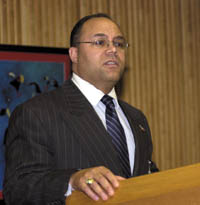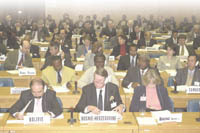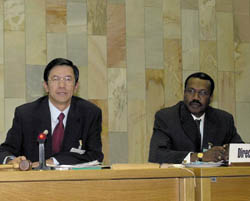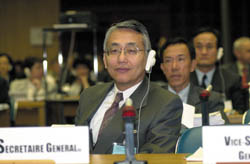Effective
regulation

Photo: Avaya (010045)
|
World regulators develop action plan to promote regulatory effectiveness
and independence
Regulators are quickly emerging as one of the most important players in today’s
telecommunication landscape. They are called upon to make key decisions on a
range of issues including market entry, interconnection terms and conditions,
end-user tariffs and quality of service standards. Regulators’ decisions not
only affect the bottom line for ITU Sector Members, but also provide the bedrock
upon which rest ITU initiatives targeted at bridging the digital divide.
Competition can help to spread new information and communication technology
(ICT) networks and services to a greater segment of the population.
But competition cannot, by itself, achieve all social or economic goals ICTs
promise to attain. Regulators are needed to send the signal that markets are
safe for investment. They must also take an active role to ensure that vital
building blocks of competition, such as interconnection and resale, are provided
in a fair and transparent fashion. At the same time, regulators must develop
enforceable universal service programmes that bring networks and affordable
services to rural and urban populations alike.
Because of the growing importance
of regulatory bodies, the ITU Telecommunication Development Bureau (BDT) hosted
the second annual Global Symposium for Regulators (GSR) in Geneva from 3 to 5
December 2001. The symposium was chaired by Anthony S.K. Wong, Director-General
of Telecommunications at the Office of the Telecommunications Authority (OFTA)
in the Special Administrative Region of Hong Kong (China). GSR’s success has
ensured that it will become an annual event. Some 369 delegates from 102 ITU
Member States, including 72 national regulatory authorities from around the
globe attended the event.
 Michael
Powell, Chairman of the United States Federal Communications Commission,
the world’s oldest regulatory body Michael
Powell, Chairman of the United States Federal Communications Commission,
the world’s oldest regulatory body
ITU 020014
|
Among the participants were Michael Powell, Chairman of the United States
Federal Communications Commission (FCC), the world’s oldest regulatory body;
Jamil Mulla, Governor of Saudi Communications Commission, one of the world’s
newest regulatory bodies; heads of regulatory authorities from sparsely
populated countries, for example Phillip Aeava, Director General of the Papua
New Guinea Telecommunications Authority; as well as regulators from densely
populated countries, for example Maya Shanker Verma, Chairman of the
Telecommunications Regulatory Authority of India (TRAI).
Leaders from some 55 regulatory authorities, including Australia, Brazil,
Botswana, Costa Rica, Denmark, France, Jordan, the Republic of Korea, Norway,
the Philippines, Switzerland, and Uganda, also took time from their busy
schedules to participate in the symposium. Many countries in the process of
establishing regulatory bodies, such as Latvia whose law was passed on 1
December 2001, were also represented. These ITU Member States not only had the
opportunity to share views and experiences with their counterparts who have
already created a regulatory body, but also heard the views of leading
regulatory experts, including William Wigglesworth, Joint Director of the
International Institute for Regulators in Telecommunications at Westminster
University; Eli Noam, Director of the Columbia University Institute for
Tele-Information and Hank Intven, Editor of the Telecommunications Regulation
Handbook.
 ITU 020015
ITU 020015
|
ITU highlighted the regulatory expertise and resources of the BDT Sector
Reform Unit, including its five case studies on effective regulation. In
addition, GSR attracted international and regional organizations including the
World Trade Organization, the European Commission and the Commonwealth
Telecommunications Organization, as well as regional regulatory associations
such as the Latin American Forum for Telecommunication Regulatory Entities
(REGULATEL) and the Telecommunication Regulators Association of Southern Africa
(TRASA).
As a global gathering of regulators and regulatory experts, GSR fills a need
among the ITU membership that had gone unmet for years. It has been described by
many participants as “the only global venue to foster a free and frank
dialogue among regulators”.
GSR was held during a time of growing challenges for the telecommunication
sector, generated by the current market downturn and the evolution of the
telecommunication market into the convergent ICT sector. As BDT Director,
Hamadoun I. Touré, said at the opening ceremony, “the ICT sector is seen not
only as an economic engine, but also an enabler of social, educational and
medical progress. The importance of access to ICT systems has grown accordingly.
It is for this reason that national and international policy-makers are
harnessing their energy to transform the digital divide into a digital
opportunity. Initiatives aimed at providing universal service and bridging the
digital divide form the core of the BDT mandate. Perhaps the most fundamental
task of ICT sector reform is to establish an effective and transparent
regulatory authority.”
 “It
is not enough merely to create a regulatory body; they must be given the
tools needed to develop as effective regulators.” Anthony S.K. Wong
(left), Director-General of Telecommunications at OFTA and Chairman of the
second GSR. “It
is not enough merely to create a regulatory body; they must be given the
tools needed to develop as effective regulators.” Anthony S.K. Wong
(left), Director-General of Telecommunications at OFTA and Chairman of the
second GSR.
“The ICT sector is seen not
only as an economic engine, but also an enabler of social, educational and
medical progress.” Hamadoun I. Touré (right), BDT Director
Photo: A. de Ferron (ITU 020016)
|
“Regulators are enablers and facilitators,” Mr Wong noted during the
opening ceremony. “It is not enough merely to create a regulatory body; they
must be given the tools needed to develop as effective regulators,” the GSR
Chairman added.
It is for this reason that “Effective regulation” was chosen as the theme
of the symposium. Key issues such as staffing and financing regulatory bodies,
the regulator’s mandate, sanctions power and transparency in the
decision-making process were discussed throughout the meeting. These issues were
explored at a session dedicated to the five case studies on regulatory
effectiveness and independence conducted by BDT in Botswana, Brazil, Morocco,
Peru and Singapore (www.itu.int/ITU-D/treg/
). Summaries of the Morocco, Botswana
and Brazil case studies were featured in the October, November and December 2001
issues of “ITU News”, respectively.
Effective regulation was also the focus of discussion at another session,
where authors of the forthcoming edition of Trends in Telecommunication Reform
2002: Effective Regulation shared their findings with a series of distinguished
panelists. The 2002 Trends report will be released on the occasion of the ITU
World Telecommunication Development Conference (WTDC-02) to be held in Istanbul
(Turkey) from 18 to 27 March 2002.
GSR participants agreed that recruiting, training and utilizing qualified
staff is perhaps the most critical part of the process of establishing an
effective regulatory authority. Regulatory bodies, such as the Botswana
Telecommunications Authority (BTA), emphasized training as their lifeline.
Likewise, empowering a regulatory body to finance its own operations, through
the collection and retention of licensing fees, not only ensures that the agency
has sufficient funds to fulfil its mandate, but also insulates it from the kind
of political influence that often accompanies government appropriations.
Regulators also emphasized the importance of financing measures that balance
independence from political influence with the goals of fostering competition
and meeting universal service goals. Regulators repeatedly identified consumer
protection as one of their most important mandates.
 “I
am quite happy to witness today that about 80 countries have a competitive
telecommunications market and 112 of the 189 ITU Member States have
established a regulatory authority.” Yoshio Utsumi, ITU
Secretary-General “I
am quite happy to witness today that about 80 countries have a competitive
telecommunications market and 112 of the 189 ITU Member States have
established a regulatory authority.” Yoshio Utsumi, ITU
Secretary-General
Photo: A. de Ferron (ITU 020017)
|
The symposium also discussed the institutional framework necessary to
establish an effective regulatory body, and agreed that transparency in the
decision-making process is one of the most important hallmarks of effective
regulation. Regulators who obtain information from the regulated industry and
other interested parties can make decisions based on all relevant facts and
diverse views. Transparency further affects regulatory certainty, reliability,
accountability, independence and continuity. The symposium included an in-depth
discussion of regulatory powers and functions, such as rule-making and
enforcement, focusing on regulatory monitoring, investigations, sanctions and
dispute resolution.
At least 112 of the 189 ITU Member States have established a regulatory
authority. These regulators seek concrete tools to enable them to become more
effective. In addition to providing a venue for regulators to meet and exchange
views and experiences, GSR developed a four-point action plan of recommendations
to BDT to further develop its range of products and services targeted to
regulators. In particular, BDT is to:
- Focus on skills training for regulators.
- Conduct studies to develop regulatory benchmarks and models.
- Bolster regional and sub-regional regulatory initiatives.
- Broaden input into its regulatory activities from academics, consultants
and other experts.
The symposium also came up with recommendations to further develop the Global
Regulators’ Exchange (G-REX), the hot line for global dialogue on regulatory
issues. G-REX is an on-line forum for regulators and policy-makers launched by
BDT in May 2001 in response to the recommendations of the first global gathering
of regulators held in November 2000. G-REX currently includes nine conferences
on pressing regulatory issues (see the July-August 2001 issue of ITU News, pp
37-40).
Participants praised the hot line for its success, and recommended that the
conferences be developed to mirror the hot line’s result-oriented approach.
These conferences will be used to develop benchmarks and models on key
regulatory issues such as interconnection and universal service, creating a
database of regulatory rulings, decisions, license agreements and other
regulatory instruments.
The next GSR will be held in the autumn of 2002.
|